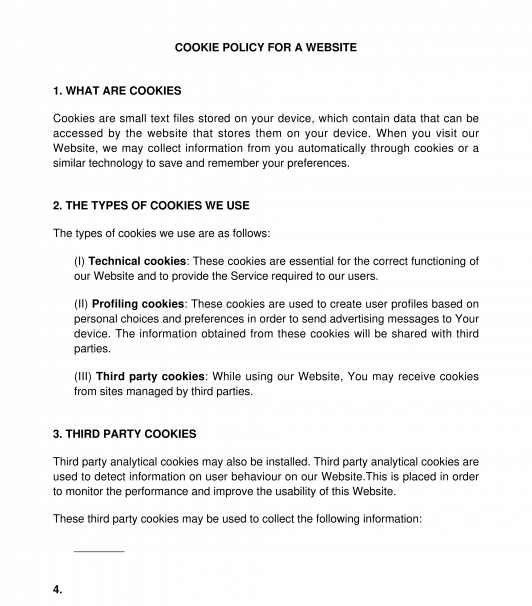 30/09/2025
30/09/2025

Answer a few questions and your document is created automatically.

Your document is ready! You will receive it in Word and PDF formats. You will be able to modify it.

 30/09/2025
30/09/2025
 Word and PDF
Word and PDF
 2 pages
2 pages



A Cookie Policy for a Website/Application is a document that sets out the policies regarding the use of cookies and similar technologies. Cookies are small text files stored in the browser of the user when the user visits a website. They are used to store the users' preferences so that the web server does not have to request specific information every time users visit the website or application.
Cookies are commonly used to store the users' information (which may be personal or other type of information) such as the users' name, username, address, password, email address, the contents of a shopping cart, etc. This helps the operator provide a personalized user experience to their users.
The different types of cookies that can be used by a website/application are technical cookies, profiling cookies, third-party cookies, analytical cookies, etc.
This document only contains the Cookie policy, but the Terms of Use and Privacy Policy are also available for download.
How to use this document
The document sets out the following:
After filling this form, the document must be published on a separate page on the website or included in the Privacy Policy document
Some websites or applications simply make the Cookie Policy available on a separate page, usually accessible via a hyperlink that appears on the same page. In this case, the end user may not review the document before accepting the contract. This is called the browse wrap agreement.
Other websites or application make the users take positive steps to confirm that the user has read the Cookie Policy. For example, the site or application may have a pop up box showing the terms and conditions where the user will be required to scroll all the way through the Cookie Policy before checking the box saying "I understand the terms and conditions of this website and have agreed to be bound by them". This is called a click wrap agreement..
Applicable laws
On May 25, 2018, the European Union (EU) General Data Protection Regulation (GDPR) came into effect to ensure the protection of personal data. It addresses the export of personal data outside the European Union. This regulation is applicable to Nigerian businesses that offer products and/or services for sale in the EU or if they engage in the processing of personal data of citizens of the EU.
In 2019, the Information Technology Development Agency (NITDA) developed the Nigeria Data Protection Regulation (NDPR) 2019, a replica of the General Data Protection Regulation (GDPR), which contains guidelines to control the use of data in Nigeria.
Other laws that apply to this document include:
How to modify the template
You fill out a form. The document is created before your eyes as you respond to the questions.
At the end, you receive it in Word and PDF formats. You can modify it and reuse it.
Cookie Policy for Website or Application - FREE
Country: Nigeria